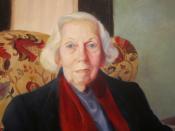Multiculturalism spread as a political and philosophical ideology back in the beginning of the 20th century as a means of "voicing" the need to deal with the ethnic and cultural diversity of nations. It started as an official policy and afterwards became a major interest for writers, especially those belonging to specific ethnic groups. The idea of multiculturalism interfered with other social and political issues, such as the feminist orientation, contributing to the development of distinct cultural identities. Women writers from the beginning of the century often advocated the female force by creating characters that do not fit the paradigm of a patriarchal society. Furthermore, they consciously or unconsciously, become symbols of their ethnic background, anticipating the later holistic approaches, that combined the struggle for civil right with those for gender equality.
The purpose of this essay is that of underlying a few aspects in the analyzed short stories that focus on women roles, feminist attitudes and perspectives in a world of changing attitudes.
The movement "from margin to center" takes place slower for women, as compared to the ethnic groups as a whole, but as they gain consciousness of their own status and begin to struggle for recognition and rights, this movement becomes essential in redefining the values of the modern world.
Two attitudes towards the feminist issue are to be traced within the analyzed short stories. The first one belongs to the women writers (Catherine Anne Porter, Flannery O'Connor, Eudora Welty, Alice Walker), who place the female character in a central position emphasizing therefore the roles that the women are able to assume. The second attitude belongs obviously to the male writers (W. Faulkner, Richard Wright, J, Steinbeck, B, Malamud), who often avoid focusing their interest on the female experience, not necessarily from a misogynistic perspective, but rather...


